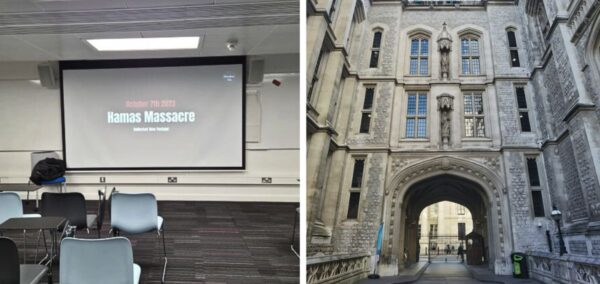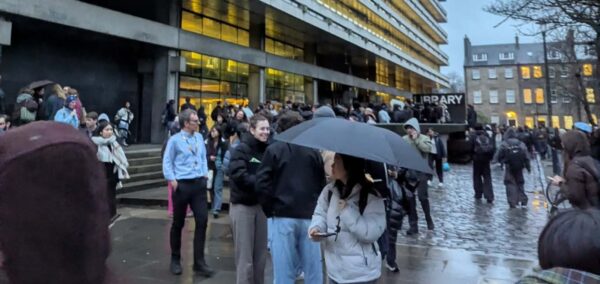UCL students are allowed to sue their uni – this is what it means for other students nationwide
Students across the country are now one step closer to winning compensation
With a High Court recently encouraging University College London to enter into direct negotiations with a team acting on behalf of current and former students, a legal path for those seeking tuition refunds for Covid and strikes is being paved.
Although this ruling applies to UCL students specifically, they only make up 5,000 of the nearly 120,000 claimants that the legal team Student Group Claim (SGC) represents nationwide in pursuit of compensation.
SGC claims that universities are watching this case closely as it sets a precedent for what could be many more students seeking tuition refunds for online classes, limited use of facilities and postponed or cancelled activities due to Covid and industrial action.
What has happened so far in the UCL court case?
The case began in May, with SGC representing 924 current and former UCL students in court. Now, thousands more have signed up and will be added to the claim form before a deal is made.
The first hearing saw SGC sue for compensation from the university for breach of a commercial contract. It argued that UCL students paid tuition fees ranging from £9,250 to £40,000 for services that were not fully delivered. The timespan of the claim extends back to the 2017-2018 academic year, before Covid, due to the impact of strikes. The most recent academic year represented in the claim is 2021-2022.
In May, UCL challenged the SGC claim with a legal argument that students must first go through the university’s internal procedures and then lodge a complaint with the Office of the Independent Adjudicator for Higher Education (OIA). Critics of this argument described it as “designed to frustrate complainants into defeat.”
Most Read
Since May, the court has deliberated on the parties’ claims, finally delivering its ruling last week. The judge rejected UCL’s argument that students must go through internal channels first, questioning both the university’s ability to deal with a high concentration of complaints and the OIA’s suitability to judge legal challenges.
Instead the judge ordered both sides to pursue direct mediation, which entails UCL negotiating a settlement with SGC outside of court. They have eight months to resolve the dispute and avoid going to trial, which would be a lengthy and costly process for both parties. If neither side is satisfied with the mediation process after four months, they can request to go to trial early.

What obstacles remain to a settlement between UCL and students?
Although the court ruling was nominally a win for UCL students, the judge acknowledged weaknesses in their legal argument.
The main outstanding issue is how the two parties will determine “quantum” – ie what compensation each student will receive. Every case is different: some courses had more virtual lessons than others; some students who study practical subjects that require access to labs or workshops may have lost out more; some departments had higher numbers of striking professors.
Other concerns raised in court relate to the fact that many students accepted their offers during the pandemic and after UCL had already announced its plans to deliver virtual teaching.
These considerations are varied and complex and mean that almost every student had a distinct experience and therefore may be entitled to a separate level of compensation. It is further complicated by the different fee levels for international and home students.
The court now expects SGC to suggest levels of compensation based on information from the members of its claim. This will prove a difficult task as the legal team continues to accept growing numbers of claimants from UCL.
What does the case mean for students from other universities?
The London court case is being watched eagerly by students across the UK who feel let down by their university experience due to strikes and Covid.
The judge’s ruling sets a legal precedent that students cannot be forced to seek restitutions through their universities nor the OIA, clearing the path for direct legal action and/or mediation.
SGC already filed pre-claims against seventeen other universities in October 2022, clearing the path for similar legal cases against them.
The universities are:
• University of Birmingham
• University of Bristol
• Cardiff University
• City University of London
• Coventry University
• Imperial College London
• King’s College London
• University of Leeds
• University of Liverpool
• London School of Economics and Political Science (LSE)
• University of Manchester
• Newcastle University
• University of Nottingham
• Queen Mary University of London
• University of Sheffield
• University of the Arts London (UAL)
• University of Warwick
The UCL ruling has given hope to some students at these universities who see it as the first step forward in a larger battle.
Amber, a student at Liverpool University, said: “I am very pleased with this outcome, and I am glad that we are one step closer to receiving the financial compensation we deserve. I hope that universities across the UK have learnt that they cannot treat students as commodities, and that we paid for an education that we did not receive.”
It is also likely that decision makers at universities are watching the UCL case and will be more willing to go to the table for direct talks on compensation, knowing that a costly legal battle may be futile in deterring students’ claims.
Now, in the wake of their recent victory in court, SGC expects increasing numbers of cases and claimants in the coming months, planning to write to over 80 more universities to file new claims.
After an arduous fight for compensation, the UCL case may well prove a light at the end of the tunnel for frustrated current and former students across the country.
Professor Kathleen Armour, UCL’s Vice-Provost (Education & Student Experience) said: “We know that the last few years has been a very difficult time for many students. They have faced challenges and disruption from COVID and, in some cases, industrial action too. Supporting our students, their wellbeing and their educational achievements is always UCL’s priority.
“Throughout the pandemic we prioritised the health and safety of our whole community and followed UK Government guidance, working tirelessly to make our campus and all UCL premises as safe as possible so that a high-quality academic experience could continue to be provided.
“We respect the right of our students to complain and seek redress if they feel that they have not received the support they expected from us. We still believe our complaints procedure represents the most efficient, cost-effective and swiftest way for students to resolve their complaints. We are pleased that the High Court has ordered that proceedings be stayed to allow for the parties to attempt to resolve the students’ claims without the need for further litigation, and that the Court has recognised the part our complaints procedure can play.
“We remain confident that our complaints process is the best route for our students. Should anyone be unsatisfied with our response to their complaint, they also have the further option of asking the Office of the Independent Adjudicator for Higher Education, the appointed independent body for student complaints, to review UCL’s decision.”
Related articles recommended by this author:
• ‘We were so tremendously affected’: Students take UCL to court over pandemic disruptions
• These London students are suing their unis for refunds over disruptions since Covid
• Meet the London student who wore an ‘I want a refund’ banner to her graduation ceremony

















